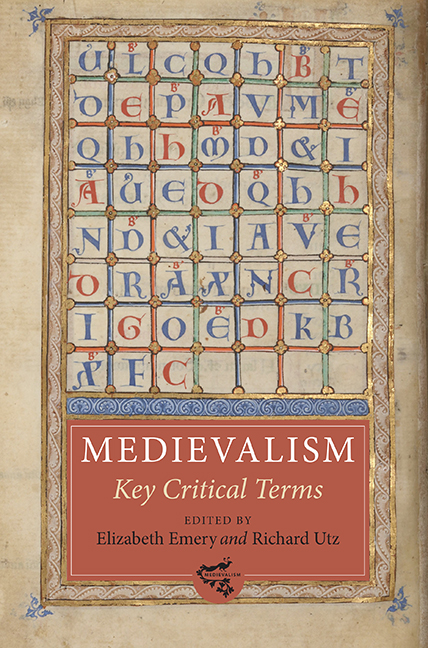Book contents
- Frontmatter
- Dedication
- Contents
- List of Illustrations
- List of Contributors
- Making Medievalism: A Critical Overview
- 1 Archive
- 2 Authenticity
- 3 Authority
- 4 Christianity
- 5 Co-disciplinarity
- 6 Continuity
- 7 Feast
- 8 Genealogy
- 9 Gesture
- 10 Gothic
- 11 Heresy
- 12 Humor
- 13 Lingua
- 14 Love
- 15 Memory
- 16 Middle
- 17 Modernity
- 18 Monument
- 19 Myth
- 20 Play
- 21 Presentism
- 22 Primitive
- 23 Purity
- 24 Reenactment
- 25 Resonance
- 26 Simulacrum
- 27 Spectacle
- 28 Transfer
- 29 Trauma
- 30 Troubadour
- Index
- Medievalism
1 - Archive
Published online by Cambridge University Press: 08 October 2022
- Frontmatter
- Dedication
- Contents
- List of Illustrations
- List of Contributors
- Making Medievalism: A Critical Overview
- 1 Archive
- 2 Authenticity
- 3 Authority
- 4 Christianity
- 5 Co-disciplinarity
- 6 Continuity
- 7 Feast
- 8 Genealogy
- 9 Gesture
- 10 Gothic
- 11 Heresy
- 12 Humor
- 13 Lingua
- 14 Love
- 15 Memory
- 16 Middle
- 17 Modernity
- 18 Monument
- 19 Myth
- 20 Play
- 21 Presentism
- 22 Primitive
- 23 Purity
- 24 Reenactment
- 25 Resonance
- 26 Simulacrum
- 27 Spectacle
- 28 Transfer
- 29 Trauma
- 30 Troubadour
- Index
- Medievalism
Summary
IN CONTEMPORARY USAGE, an archive is a site for the unique and the exceptional. The value of the items preserved in an archive is commonly understood to stand in relationship to their distinctiveness or rarity. The Oxford English Dictionary exposes a challenging circularity in its definition of an archive as “a place in which public records or other important historic documents are kept.” Which documents are important, or, for that matter, historic, is rarely a judgment that can be made before the fact. The value of the archive resides not, primarily, in what is preserved. Rather, it is the potentialities the archive contains: the historical record finds meaning in its range of uses in the present. In England, the idea of “public records” came into focus around the documents of England's medieval past, particularly as they entered private hands over the course of the sixteenth and seventeenth centuries. The archives of the medieval past should be understood as about use, not existence – as always suited to the present in which they are deployed, rather than anchored in the past of their contents. This essay will trace the development of the idea of the archive, and the ways in which the archive was claimed to authorize its uses, from the creation of the medieval documentary record, to the early modern use of the authority seemingly borne by medieval documents, to contemporary projects digitizing the medieval past.
In 1291, the English King Edward I sent a request to the heads of cathedral chapters and monasteries to reply to him with anything “touching the status of the realms of England and Scotland and their rulers.” Edward was hoping to prove that England rightfully held overlordship of Scotland, and that his broad call for information would turn up useful results. Edward's investigation assumed these institutions stored texts relevant to his purposes – that there was something to be found in books of historiography and in documents, whether bound singly or collected in rolls. Edward received many responses, and used the textual record of the past to make legal and political arguments about the present. Though some of the replies were to his advantage, seemingly attesting to Scottish kings of the distant or even fictional past paying homage to English kings, others were not.
- Type
- Chapter
- Information
- Medievalism: Key Critical Terms , pp. 11 - 18Publisher: Boydell & BrewerPrint publication year: 2014
- 1
- Cited by

